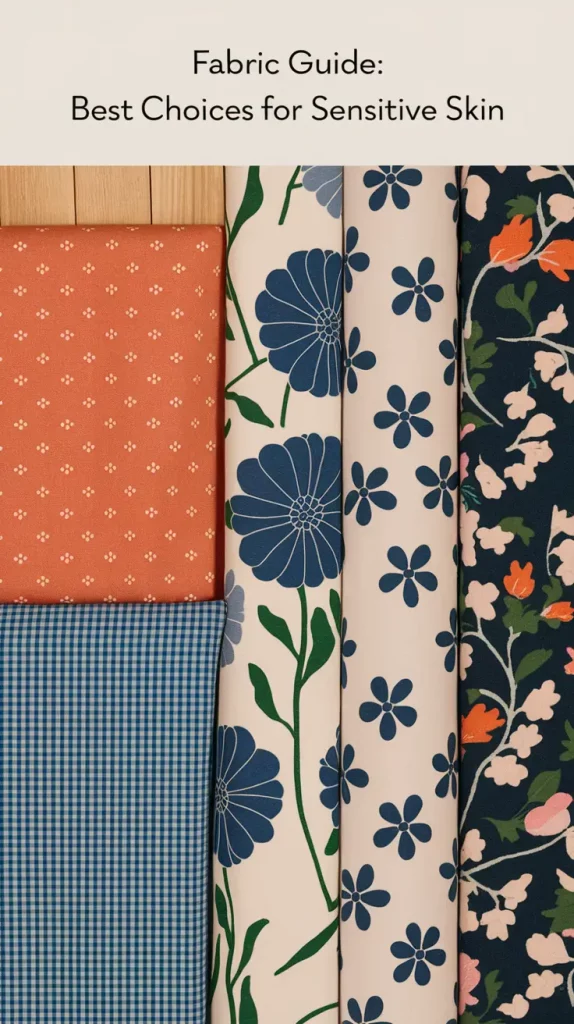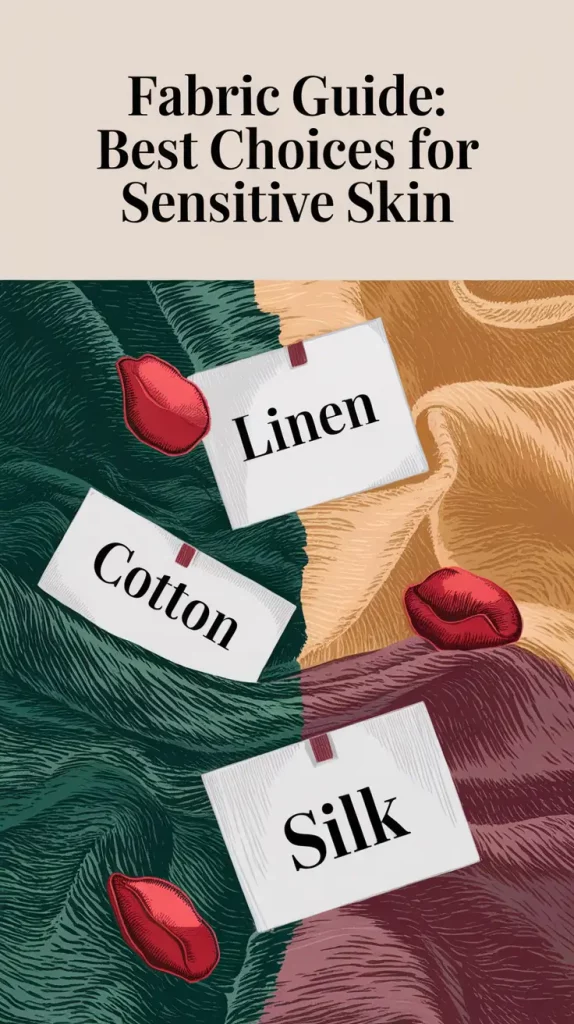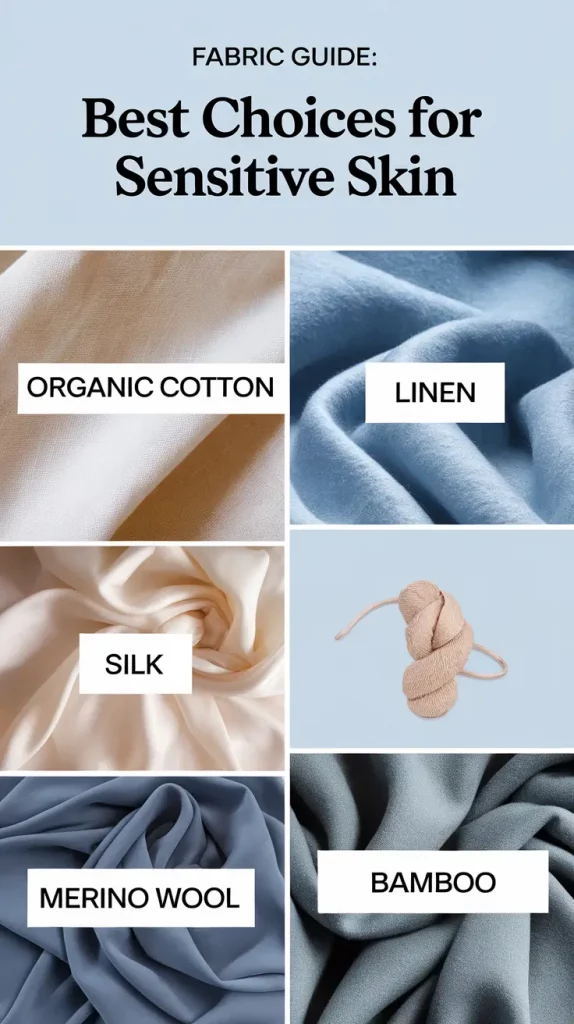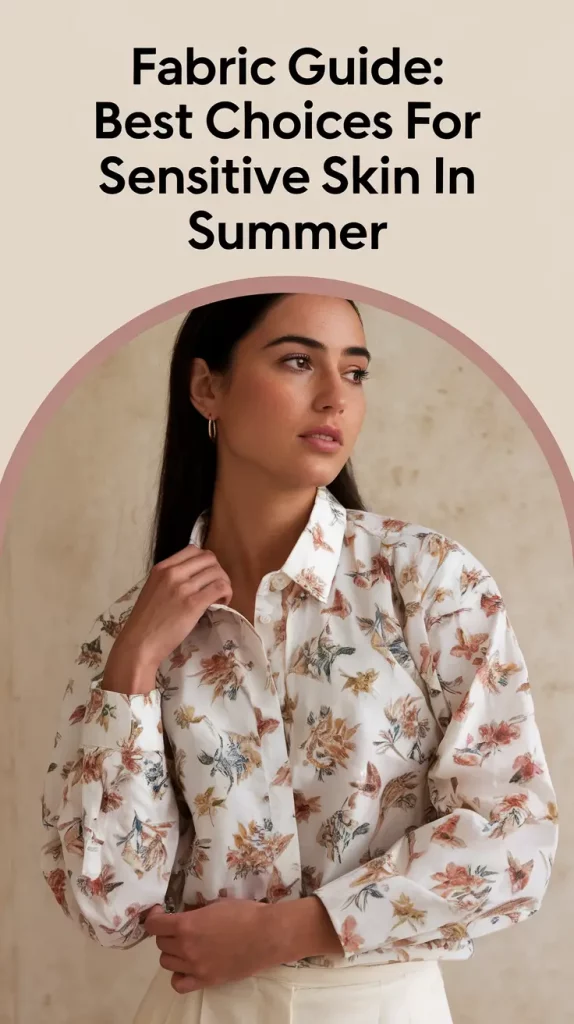Best Fabrics for Sensitive Skin in Summer 2025: Shop the Softest, Safest Options in the U.S.
The U.S. has seen a major increase in summertime skin irritations, according to dermatologists for the year 2025. Analysis reveals that clothing plays a major role in causing heat rashes and contact dermatitis, although many people think the problem stems from temperature alone.
Sufferers of sensitive skin encounter difficult situations when trying to survive summertime. Clothing that soothes and protects your skin exists as a better alternative to what causes your skin to respond negatively. The guide provides details about summer fabrics that suit sensitive skin and reveals online and offline identification strategies for these fabrics and highlights notable American brands as of today.
Who is this guide for? The guidelines apply to every individual who experiences discomfort from summer conditions, including people with eczema and those with psoriasis, along with other sufferers of skin irritation. The guidance in this guide caters to parents as well as outdoor enthusiasts and those who shop online to help them experience comfort and relief from summer heat.

Why Fabric Choice Matters More Than You Think
Because summertime exposes our main organ to dangerous ultraviolet rays while causing sweat and humidity damage combined with friction abnormalities. Dragon-sensitive skin acknowledges and responds with intensity to harsh stimuli. Derogatory fabric material creates moisture points that retain sweat and friction zones that generate additional discomfort for skin surfaces.
Your clothing choice should take priority over skincare complaints because what you wear influences your body temperature more than anything else.
Some fabrics don’t breathe. Certain fabrics absorb chemicals. The material may appear smooth initially, yet it develops rough surfaces during washing. The initial step for wiser hot-month dressing requires understanding textile reactions on human skin.
Key Features to Look for in Summer Fabrics
Breathability
A breathable fabric allows airflow between your body and the environment. It reduces sweating and heat buildup—key for preventing skin inflammation.
Moisture-Wicking Ability
Fabrics like bamboo and modal are known for pulling moisture away from the body. This helps keep your skin dry and reduces the risk of fungal irritation and heat rash.
Hypoallergenic Properties
Look for labels like “OEKO-TEX Certified” or “GOTS Certified Organic.” These indicate minimal chemical treatments and lower allergen potential.
Softness & Non-Abrasive Texture
A fabric might look smooth but feel harsh. Sensitive skin responds best to ultra-soft textures that don’t rub or snag.

7 Best Fabrics for Sensitive Skin in Summer 2025
Let’s break down the top fabrics that combine softness, breathability, and skin-friendliness. These materials are increasingly available in U.S. stores and e-commerce platforms.
1. Organic Cotton
- Extremely soft, breathable, and absorbent
- No synthetic chemicals or irritants
- Great for everyday wear, underwear, and baby clothes
Top U.S. brands: Pact, Coyuchi, Boody
2. Linen (Preferably Stonewashed)
- Highly breathable and cool to touch
- Natural antibacterial properties
- Gets softer with each wash
Style tip: Go for loose-fitting cuts to minimize fabric-skin contact.
3. Bamboo Viscose
- Naturally hypoallergenic and moisture-wicking
- Soft like silk but more durable
- Sustainable and biodegradable
Best for: Sleepwear, undergarments, and base layers
4. TENCEL™ (Lyocell)
- Known for smooth texture and breathability
- Produced via eco-friendly closed-loop process
- Feels like cotton but with enhanced moisture control
Brands using TENCEL: Allbirds, Eileen Fisher, tentree

5. Modal
- Lighter and softer than cotton
- Excellent elasticity without synthetic feel
- Often blended with cotton for extra comfort
Great choice for sensitive skin + style-conscious dressers.
6. Silk (Preferably Organic)
- Naturally hypoallergenic
- Lightweight and luxurious
- May need delicate care but worth it for special occasions
Caution: Not ideal for humid, sweaty days unless blended.
7. Hemp Blends
- Durable and resistant to UV
- Antimicrobial
- Best when blended with organic cotton for softness
Fabrics to Avoid If You Have Sensitive Skin
Not all fabrics are friends of fragile skin. Be cautious of the following fabrics:
| Fabric | Why Avoid |
|---|---|
| Polyester | Traps heat and moisture |
| Nylon | Can irritate due to tight weave |
| Acrylic | Synthetic fibers known for causing rashes |
| Cheap Viscose | Often chemically processed |
| Blended Synthetics | Often contain unknown chemicals |
These fabrics often feel fine initially but become irritating over time, especially after multiple washes or hot days.
How to Read Clothing Labels Like a Pro
Navigating textile labels can be tricky, especially when shopping online. Here’s what to keep in mind:
Look For:
- “100% Organic Cotton” or “Bamboo Viscose”
- Certifications: OEKO-TEX, GOTS, USDA Organic
- Made in USA or countries with strict textile safety laws (e.g., Germany, Canada)
Avoid:
- Terms like “performance blend,” “technical fabric,” or vague terms like “soft-touch”
- Labels missing material breakdowns
Where to Shop in the U.S. for Skin-Friendly Clothing in 2025
Shopping in 2025 has gone digital, but these U.S.-based retailers lead the way for safe and stylish clothing:
| Brand | Specialty | Website |
|---|---|---|
| Pact | Organic cotton basics | wearpact.com |
| Body | Bamboo essentials | boodywear.com |
| Coyuchi | Luxury organic textiles | coyuchi.com |
| Eileen Fisher | Sustainable fashion | eileenfisher.com |
| Tentree | Eco-certified casual wear | tentree.com |
Fabric Trends in 2025 for Sensitive Skin Wearers
Dermatologist-approved fashion is trending—and not just for medical reasons. More U.S. designers are turning to sustainable, skin-loving materials. TENCEL and bamboo-based blends are at the forefront.
Also gaining traction:
- Adaptive climate fabrics that change breathability based on humidity
- Textile probiotics to support skin microbiome health
How do you feel about wearing clothing that actively supports your skin health? Would you give it a try?
Conclusion: Choose Smart, Wear Lighter, Feel Better
Here’s what you should remember:
- Prioritize natural and certified fabrics like cotton, bamboo, and TENCEL.
- Avoid synthetic blends that trap heat and moisture.
- Check labels and certifications—don’t trust vague marketing.
- Stick with reliable U.S. brands that invest in skin-friendly fabrics.
Clothing serves as your first line of defense for summer skincare, not just for fashion.

